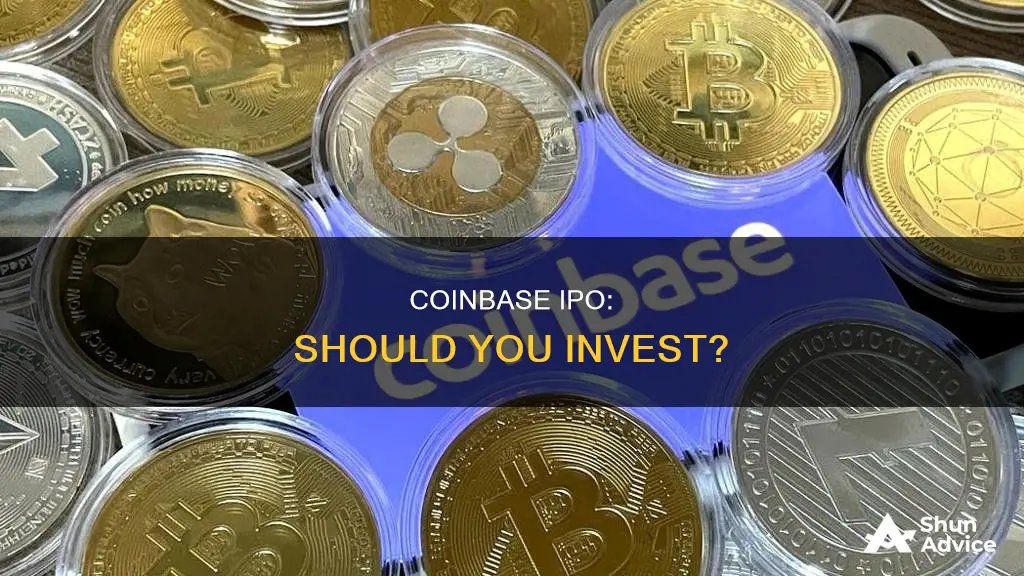
Coinbase is a cryptocurrency exchange that allows users to trade cryptocurrencies such as Bitcoin and Ethereum. In April 2021, Coinbase became the first company specializing in cryptocurrencies to go public, listing on the Nasdaq stock exchange under the ticker symbol COIN. Unlike a traditional IPO, Coinbase used a direct listing, where the company's insiders or shareholders sell stock directly to the public through the exchange. This means that the company itself is not raising money by selling new shares, and there is no underwriter. Coinbase's direct listing on the Nasdaq exchange marked a significant moment in the world of cryptocurrencies, as it provided investors with an opportunity to gain exposure to the cryptocurrency market without directly investing in cryptocurrencies.
| Characteristics | Values |
|---|---|
| IPO date | 14 April 2021 |
| IPO type | Direct listing |
| Number of shares | 115 million |
| Ticker symbol | COIN |
| IPO price per share | $250 |
| Private market valuation | $68 billion |
| 2020 revenue | $1.2 billion |
| 2020 profit | $300 million |
| 2021 Q1 revenue | $1.8 billion |
| 2021 Q1 net income | $800 million |
| Number of verified users | 56 million |
| Fee structure | Spread fees |
| Fee amount | 0.5% |
What You'll Learn

Coinbase's IPO is a watershed moment for the crypto industry
Coinbase's public debut on the Nasdaq stock exchange in April 2021 was highly anticipated by investors and marked a turning point for the cryptocurrency market. As the largest crypto platform in the US, Coinbase's arrival on the public markets via a direct listing (instead of a traditional IPO) reflected the growing mainstream adoption of cryptocurrencies. This move provided investors with a more conservative way to gain exposure to the crypto market without directly purchasing cryptocurrencies.
The company's business model, founded in 2012 by Brian Armstrong and Fred Ehrsam, centres on making crypto investing and transacting more accessible, efficient, and fair. Coinbase earns fees and commissions from customer crypto purchases and sales, and its revenue has surged alongside the growth in crypto prices and demand.
The IPO highlighted the unique relationship between Coinbase's success and the performance of the crypto market. Investors were attracted by the opportunity to invest in a company closely tied to the popularity and trading volume of cryptocurrencies. However, this also presented a Catch-22: investing in a centralised company like Coinbase while believing in the decentralised nature of crypto.
The IPO also brought attention to the risks associated with direct listings, such as a potentially thin market and significant stock price fluctuations. Despite these considerations, Coinbase's IPO was a significant milestone, indicating that the financial ecosystem was starting to embrace cryptocurrencies.
Bitcoin Futures: Smart Investment, Smart Choice
You may want to see also

Coinbase's IPO is a direct listing, not a traditional IPO
Coinbase's public debut in 2021 was a highly anticipated event, as the company is the largest crypto platform in the US. However, Coinbase's public debut is unique as it is a direct listing, not a traditional IPO.
In a direct listing, a company lists its shares on a stock exchange without hiring banks or underwriters to facilitate the transaction. This means that there is no intermediary, and the company floats its shares directly to the public. In the case of Coinbase, its shares were listed on the Nasdaq exchange under the ticker symbol "COIN". The company is not raising new money, as it would in a traditional IPO, but existing shareholders are selling their shares directly to the public.
A direct listing bypasses the traditional gatekeepers of the financial markets, such as investment banks, and can be much cheaper for the company. Additionally, it may allow companies to go public without diluting the interest of private investors. However, there are no guarantees that there will be enough stock available to meet demand, which can lead to volatility in the stock price, especially right after its debut.
On the other hand, a traditional IPO involves a company selling stock, typically to raise money. An IPO is underwritten by investment banks or brokers, who perform due diligence and help set an initial share price. The underwriters also work to generate interest and sell the shares, usually to institutional investors. While this process can provide more stability and a lower risk for the company, it often results in dilution of the ownership share of existing investors.
Coinbase's choice to go public through a direct listing, instead of a traditional IPO, may have been influenced by a variety of factors, including cost and the desire to avoid diluting private investors' interest.
Smart Bitcoin Investment: Getting Started with Rs. 1000
You may want to see also

Coinbase's IPO is a risky investment
Coinbase is a cryptocurrency exchange, a platform where crypto assets may be traded. Coinbase's IPO is unusual in that it is a direct listing, not a traditional initial public offering (IPO). This means that it is the company's insiders or shareholders – not the company itself – who sell stock through the exchange directly to the public. In a traditional IPO, a company hires an investment bank to manage the process, offer advice, and ultimately sell stock to the public. The company raises capital by selling newly issued stock, and some insiders may cash out some of their stock as well.
There are several risks associated with Coinbase's direct listing. Firstly, the market for the stock may be thin or non-existent, as there is no guarantee that insiders want to sell their shares. This means that the stock may be difficult to access, and its price could fluctuate significantly, especially initially. Secondly, Coinbase will have a dual-class share structure, which gives some insiders, often officers, extra voting control. This structure is not popular with outside investors as it gives them less say in how the company is run. Thirdly, in a direct listing, only insiders are looking to cash out, and they may have various reasons for doing so, including benign and potentially malicious motives. Finally, direct listings do not enjoy the same benefits as traditional IPOs, such as investment banks marketing the stock to institutional investors and setting an IPO price to create a "fair value".
There are also risks associated with investing in a cryptocurrency exchange like Coinbase. Your investment's success is tied to the popularity and trading volume of cryptocurrencies. If crypto loses its appeal and users stop exchanging on Coinbase, this could impact revenue. Coinbase's fate is tied to the performance and uptake of bitcoin and other cryptocurrencies. If investors lose interest in cryptocurrencies, Coinbase's business will suffer. Additionally, Coinbase faces competition from new entrants to the market, such as Binance, which has become the market leader in daily volumes since its launch in 2017.
In conclusion, while Coinbase's IPO may provide a more conservative investment in the cryptocurrency market compared to buying bitcoin itself, it is not without risks. Investors should carefully consider these risks and perform their due diligence before investing.
A Beginner's Guide to Investing Money via Coinbase
You may want to see also

Coinbase's IPO is a way to invest in crypto without buying crypto
Coinbase's IPO is a unique opportunity to invest in the crypto space without actually buying any cryptocurrencies. Coinbase is a platform that allows users to buy and sell cryptocurrencies, and its IPO is a significant moment in the world of cryptocurrencies.
By investing in Coinbase's IPO, you are essentially investing in the infrastructure that supports cryptocurrencies, rather than the currencies themselves. This can be a more stable and secure option for those who are cautious about the volatile nature of the crypto market.
Coinbase's IPO is different from a traditional initial public offering (IPO) because it is a direct listing. This means that Coinbase is selling its shares directly to the public without hiring banks to underwrite the transaction. The company is also not raising new money, as is typically done in an IPO. Instead, they are selling existing shares, with a private market valuation of about $68 billion.
There are a few things to keep in mind if you're considering investing in Coinbase's IPO. Firstly, the price of Coinbase stock may fluctuate significantly, especially in the early days, due to the relatively few shares being traded compared to strong demand. Secondly, investing in Coinbase means your investment is correlated with the level of activity in cryptocurrencies, especially Bitcoin and Ether, as these are the two largest cryptocurrencies that Coinbase's trading is centred on. Therefore, it is important to have a long-term investment strategy when it comes to Coinbase, as the crypto market operates in cycles of boom and bust.
Smartly Diversifying Your Crypto Portfolio: How Many Coins?
You may want to see also

Coinbase's IPO is a way to gain exposure to the crypto market
Coinbase is a cryptocurrency exchange that allows users to trade cryptocurrencies such as Bitcoin and Ethereum. In April 2021, Coinbase became the first pure-play crypto trading company to go public and be listed on a U.S. exchange.
However, it is important to note that Coinbase's fate is closely linked to the performance and uptake of cryptocurrencies. If investors lose interest in cryptocurrencies, Coinbase's business will suffer. Additionally, Coinbase faces competition from other cryptocurrency exchanges, some of which have larger trading volumes.
Investing in Coinbase through its IPO provides an opportunity to tap into the growing crypto market without the high volatility and stress associated with directly storing and trading cryptocurrencies. This may be particularly attractive to conservative investors or financial institutions that want exposure to the crypto market while minimising risk.
A Beginner's Guide to Investing in Bitcoin
You may want to see also
Frequently asked questions
Coinbase is a cryptocurrency exchange platform. It is the largest crypto platform in the US and the second-largest in the world. It was founded in 2012 by Brian Armstrong, a former Airbnb engineer, and Fred Ehrsam, a former Goldman Sachs trader.
Coinbase's stock ticker is COIN.
You can buy Coinbase stock through a brokerage account. You'll need to add money to the account and then search for Coinbase stock within the brokerage's platform using the symbol "COIN". You cannot buy Coinbase stock directly from the company.







